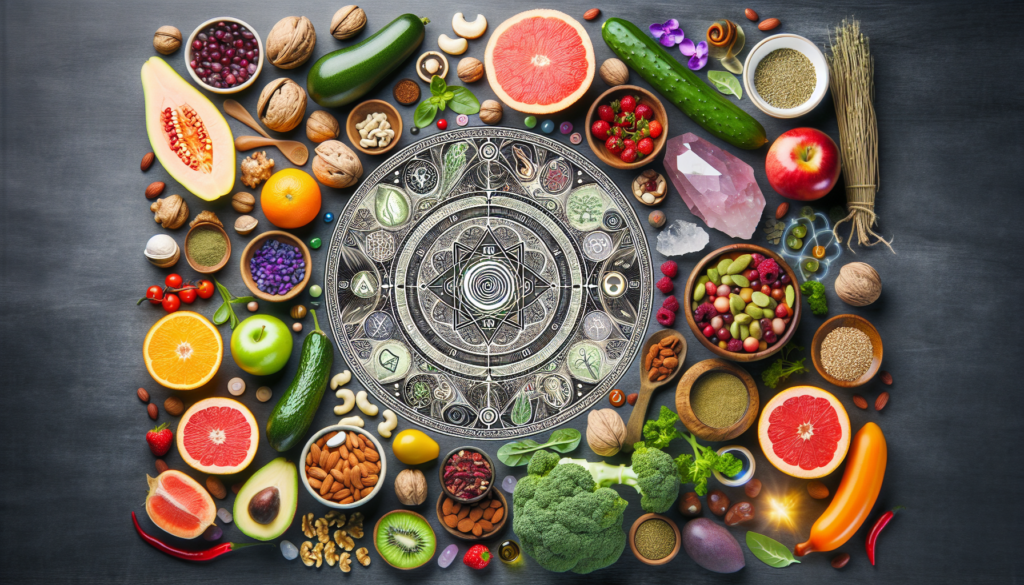Did you know that nutrition plays a crucial role in alternative medicine? It is often overlooked, but the foods we consume can have a significant impact on our overall health and well-being. In this article, we will explore how nutrition is used as a tool in alternative medicine practices, such as herbal medicine, acupuncture, and Ayurveda. From the importance of balanced diet to specific dietary recommendations, you’ll discover how the right nutrition can enhance the effectiveness of alternative treatments and promote a healthier lifestyle. So, buckle up and get ready to uncover the fascinating connection between nutrition and alternative medicine!
Understanding Alternative Medicine
Alternative medicine refers to a range of medical approaches and practices that are used as an alternative or complement to conventional medicine. These practices are often built on the principles of natural healing, focusing on holistic well-being and addressing the root causes of health issues. In alternative medicine, nutrition plays a crucial role in promoting and maintaining good health.
Definition of alternative medicine
Alternative medicine encompasses a wide array of therapies and practices, including acupuncture, chiropractic care, herbal medicine, homeopathy, naturopathy, and Traditional Chinese Medicine (TCM), among others. While conventional medicine primarily focuses on treating symptoms, alternative medicine approaches health from a more proactive and preventative perspective. It seeks to address the whole person – mind, body, and spirit – aiming to restore balance and optimize well-being.

Overview of different types of alternative medicine
Alternative medicine comprises various disciplines and practices. Acupuncture involves the insertion of thin needles into specific points on the body to stimulate the flow of energy and promote healing. Chiropractic care focuses on the alignment of the spine and manipulating the musculoskeletal system to enhance the body’s natural healing abilities. Herbal medicine utilizes plants and their extracts to address various ailments. Homeopathy involves treating illnesses with highly diluted substances that would produce similar symptoms in a healthy person. Naturopathy combines multiple therapies, including herbal medicine, nutrition, hydrotherapy, and lifestyle counseling, emphasizing the body’s natural healing capabilities.
Role of Nutrition in Alternative Medicine
Importance of nutrition in alternative medicine
Nutrition plays a pivotal role in alternative medicine because it recognizes that the food we consume can significantly impact our overall health. A balanced and nutrient-rich diet provides the foundation for optimal well-being. Alternative medicine practitioners believe that good nutrition is essential to support the body’s natural healing processes and prevent illnesses from occurring in the first place. By nourishing the body through proper nutrition, individuals can enhance their vitality and resilience.
Nutritional deficiencies and alternative medicine
Alternative medicine recognizes that nutritional deficiencies can contribute to a range of health issues. Certain conditions may arise or worsen due to inadequate intake or absorption of vital nutrients. Alternative medicine practices often involve assessing an individual’s nutritional status and addressing any deficiencies through dietary modifications or the use of nutritional supplements.
Food as medicine in alternative approaches
In alternative medicine, food is viewed as a powerful form of medicine. Different foods possess unique properties and can have specific effects on the body. Alternative medicine practitioners often use food as part of treatment plans, tailoring diets to address specific health concerns. This approach is rooted in the understanding that the body has an innate ability to heal itself when given the right tools, including a nourishing and well-balanced diet.

Alternative Medicine Diets
Macrobiotic diet
The macrobiotic diet is a holistic approach to nutrition that originated in Japan. It emphasizes whole grains, fresh vegetables, legumes, fermented foods, and sea vegetables. This diet aims to achieve a balance between opposing forces (yin and yang) in food, which is believed to promote overall well-being. The macrobiotic diet focuses on consuming locally sourced, seasonal, and organic foods, avoiding processed foods, refined sugars, and synthetic ingredients.
Raw food diet
The raw food diet consists of consuming predominantly raw, unprocessed, and uncooked foods. This diet emphasizes fruits, vegetables, nuts, seeds, and sprouted grains. Raw food enthusiasts believe that cooking food can diminish its nutritional value, and that raw foods contain important enzymes that aid digestion and enhance vitality. However, it is crucial to ensure proper food safety and hygiene when following a raw food diet.
Ayurvedic diet
Ayurveda, an ancient healing system from India, incorporates diet as an integral part of its holistic approach to health. The Ayurvedic diet emphasizes balancing the three doshas – Vata, Pitta, and Kapha – which are believed to govern the body’s functions. Each individual has a unique constitutional makeup, and the Ayurvedic diet seeks to balance the doshas through tailored dietary choices. It promotes the consumption of fresh, seasonal foods and incorporates various herbs, spices, and teas for their therapeutic properties.
Nutritional Supplements in Alternative Medicine
Overview of nutritional supplements
Nutritional supplements are products that contain vitamins, minerals, herbs, or other substances intended to supplement the diet and support overall well-being. In alternative medicine, supplements are often used to address specific deficiencies or imbalances in the body. They are available in various forms, including capsules, tablets, powders, and liquids.
Types of supplements commonly used in alternative medicine
Alternative medicine practitioners may prescribe specific supplements based on an individual’s unique needs and health concerns. Commonly used supplements include probiotics to support gut health, omega-3 fatty acids for inflammation and brain health, adaptogenic herbs to enhance resilience to stress, and vitamin D for immune function. Other supplements frequently used include herbal extracts, amino acids, and antioxidants, among many others.
Benefits of using supplements in conjunction with alternative practices
Supplements can provide additional nutritional support in alternative medicine approaches. They are often used to address specific deficiencies or support the body’s natural healing processes. When used correctly and in combination with a healthy diet and lifestyle, supplements can help optimize well-being and enhance the effectiveness of alternative medicine practices.

Herbal Remedies in Alternative Medicine
Role of herbs in alternative medicine
Herbal remedies have been used for centuries in alternative medicine to treat and prevent various health conditions. Herbs contain a wide array of bioactive compounds that can have medicinal properties. In alternative medicine, herbs are often used to alleviate symptoms, support the body’s natural healing processes, and promote overall wellness.
Popular herbal remedies and their benefits
Several herbs are commonly used in alternative medicine for their various health benefits. For example, chamomile is known for its calming properties and is often used to promote relaxation and improve sleep. Echinacea is used to support immune function and prevent colds and flu. Turmeric is a potent anti-inflammatory herb that is believed to have numerous health benefits, including reducing joint pain and supporting cardiovascular health. St. John’s wort is often used to alleviate symptoms of depression and anxiety.
Possible risks and side effects
While herbs are generally considered safe when used appropriately, they can still pose risks and side effects. It is important to consult with a qualified healthcare professional who specializes in alternative medicine before taking herbal remedies, especially if you have underlying health conditions, are taking medications, or are pregnant or breastfeeding. Some herbs may interact with medications or have contraindications for certain health conditions. It is crucial to ensure proper dosage, quality, and safety when using herbal remedies.
Traditional Chinese Medicine and Nutrition
Overview of Traditional Chinese Medicine (TCM)
Traditional Chinese Medicine (TCM) is an ancient holistic healing system that originated in China over 2,000 years ago. TCM encompasses various practices, including acupuncture, herbal medicine, dietary therapy, massage (tui na), and movement exercises (such as qigong and tai chi). TCM views the body as an interconnected system where imbalances in energy flow can lead to illness. TCM seeks to restore balance and harmony through personalized treatments.
TCM dietary therapy and principles
Dietary therapy is an integral part of TCM, based on the understanding that food can influence the body’s energy (Qi) and balance the Yin and Yang energies. TCM emphasizes the consumption of fresh and seasonal foods, with an emphasis on balancing flavors and incorporating the five elements (wood, fire, earth, metal, and water) into meals. TCM dietary principles take into account an individual’s constitutional type, current health condition, climate, and the energetic properties of food, aiming to nourish the body and promote well-being.
Using foods to balance energy in TCM
In TCM, certain foods are believed to have specific energetic properties that can help balance the body’s energy. For instance, warming foods, such as ginger and cinnamon, are often recommended for individuals with cold constitutions or experiencing cold-related symptoms. Cooling foods, such as cucumber and watermelon, are advised for individuals with excess heat or inflammation. TCM also emphasizes the importance of mindful eating, proper food combining, and paying attention to the energetic effects of cooking methods.

Nutritional Counseling in Alternative Medicine
Importance of nutritional counseling
Nutritional counseling is a vital aspect of alternative medicine, as it helps individuals understand the role of nutrition in their overall health and well-being. By providing personalized guidance and education, nutritional counselors empower individuals to make informed dietary choices that support their specific health goals and address their unique needs.
Role of the nutritionist in alternative medicine
Nutritionists specializing in alternative medicine play a crucial role in helping individuals optimize their health through diet. They assess an individual’s nutritional status, health concerns, dietary patterns, and lifestyle factors to develop personalized nutrition plans. By combining their knowledge of alternative medicine principles and nutrition science, nutritionists provide evidence-based recommendations to enhance overall well-being.
Creating personalized nutrition plans
When creating personalized nutrition plans, alternative medicine nutritionists take into account an individual’s dietary preferences, cultural background, and specific health goals. They may recommend dietary modifications, portion control strategies, meal planning techniques, and mindful eating practices. A tailored nutrition plan considers the individual’s unique needs, taking into account any existing health conditions, nutritional deficiencies, or food sensitivities.
Detoxification and Cleansing Diets
Benefits of detoxification in alternative medicine
Detoxification is a process of eliminating toxins and waste products from the body, promoting overall health and well-being. Alternative medicine recognizes that toxins can accumulate in the body through environmental exposures, poor dietary choices, and lifestyle factors. Detoxification diets aim to support the body’s natural detoxification pathways, optimize organ function, and enhance vitality.
Different types of cleansing diets
Cleansing diets vary in their approach and intensity. Some popular cleansing diets include juice cleanses, where individuals consume only freshly pressed juices for a set period, and elimination diets, where certain foods, such as gluten or dairy, are temporarily removed to identify potential food sensitivities or triggers. Other cleansing diets may involve the use of specific herbs, supplements, or fasting protocols. It is important to approach cleansing diets under the guidance of a qualified healthcare professional to ensure safety and effectiveness.
Role of nutrition in detoxification
Nutrition plays a fundamental role in supporting detoxification. When following a cleansing or detoxification diet, individuals often focus on consuming whole, nutrient-dense foods and eliminating processed or inflammatory foods. This approach aims to provide the body with essential nutrients while minimizing exposure to potential toxins. Adequate hydration, consumption of antioxidant-rich foods, and supporting liver health through specific foods and supplements are common strategies in detoxification protocols.

The Gut-Brain Connection in Alternative Medicine
Understanding the gut-brain connection
The gut-brain connection refers to the bidirectional communication and interaction between the gut and the brain. In alternative medicine, this connection is recognized as playing a significant role in overall well-being. Research suggests that imbalances in the gut microbiome, an ecosystem of microorganisms in the digestive system, can influence brain function, mental health, and overall physiological processes.
Role of nutrition in supporting gut health
Nutrition plays a crucial role in supporting gut health. A well-balanced diet rich in fiber, prebiotic foods, and probiotic-rich fermented foods can promote a healthy gut microbiome. Prebiotics are non-digestible fibers that serve as fuel for beneficial gut bacteria, while probiotics are live bacteria that can confer health benefits when consumed. Including a variety of plant-based foods, such as fruits, vegetables, whole grains, and legumes, can support a diverse and thriving gut microbiome.
Effect of gut health on overall well-being
The gut microbiome has been linked to various aspects of health, including digestion, immune function, mental health, and even chronic diseases. Imbalances in the gut microbiome have been associated with conditions such as irritable bowel syndrome (IBS), autoimmune diseases, and mood disorders. By supporting gut health through proper nutrition, individuals can potentially improve their overall well-being, from digestive comfort to mental and emotional resilience.
Integrating Nutrition with other Alternative Medicine Practices
Nutritional support in acupuncture
Acupuncture is a traditional Chinese healing practice that involves the insertion of fine needles into specific points on the body. While acupuncture primarily focuses on manipulating the body’s energy pathways, nutrition can be integrated to enhance the overall effectiveness of treatments. Nutritional support can provide the necessary building blocks for the body to heal and restore balance. Acupuncturists may provide dietary recommendations to support specific treatment goals or address underlying imbalances.
Nutrition and aromatherapy
Aromatherapy involves the use of essential oils extracted from plants to promote relaxation, improve mood, and support overall well-being. While aromatherapy primarily utilizes inhalation or topical application, nutrition can complement this practice by incorporating foods and beverages that have similar aromatic properties. For example, herbal teas or adding fresh herbs to meals can provide aromatic compounds that synergize with the benefits of aromatherapy.
Role of nutrition in energy healing
Energy healing modalities, such as Reiki or crystal healing, focus on balancing and harmonizing the body’s energy field. Nutrition can play a supporting role in energy healing by providing the necessary nutrients and energy for the body’s healing processes. A nourishing diet can enhance an individual’s overall vitality, energy levels, and receptivity to energy healing treatments. Additionally, nutrition can help address any underlying imbalances or deficiencies that may be affecting energy flow.
In conclusion, nutrition plays a significant role in alternative medicine. It is recognized as a cornerstone for promoting and maintaining good health in various alternative medicine practices. By understanding the importance of nutrition, individuals can harness the power of food as medicine, tailor their diets to support their unique health needs, and optimize their overall well-being.


